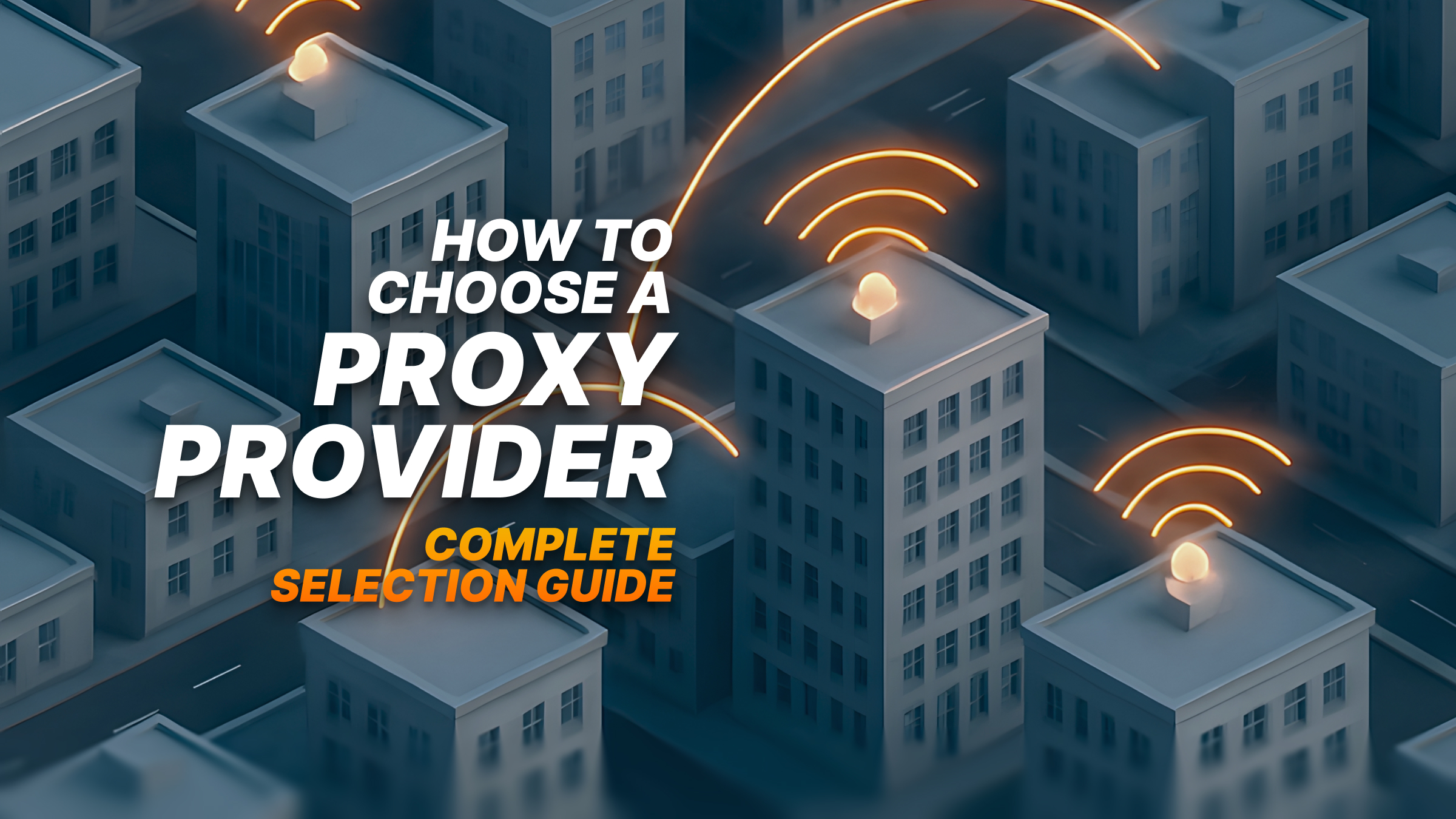Selecting the right residential proxy provider is crucial for businesses that rely on web scraping, data collection, market research, or competitive analysis. This comprehensive guide covers the essential factors you need to evaluate when choosing a proxy provider that meets your specific requirements.
What Are Residential Proxies and Why Do They Matter?
Residential proxies route your internet traffic through IP addresses assigned to real residential devices by Internet Service Providers (ISPs). Unlike datacenter proxies, residential proxies appear as legitimate home connections, making them less likely to be detected and blocked by websites. This authenticity comes at a premium but provides superior success rates for accessing geo-restricted content and bypassing sophisticated anti-bot measures.
How to Choose the Best Residential Proxy Provider?
Focus on four key criteria when selecting a residential proxy provider. First, verify that success rates exceed 95% for your target websites and use cases. Second, ensure response times meet your application requirements (under 1000ms for most use cases). Third, confirm geographic coverage includes your target regions with sufficient IP density. Fourth, evaluate the provider's infrastructure quality, including backbone connections and server distribution.
The best providers combine high-quality IP pools with reliable performance, transparent compliance practices, and comprehensive technical support to ensure your operations run smoothly.
What Pool Size Do You Need for Residential Proxies?
A quality residential proxy provider should offer at least 1-10 million IP addresses across multiple countries. However, pool size alone isn't everything – IP diversity, rotation frequency, and geographic distribution are equally important. A smaller pool with high-quality, frequently refreshed IPs from diverse subnets often performs better than a larger pool with stale or concentrated addresses.
Look for providers that offer substantial IP coverage in your target regions. Geographic coverage should include the specific countries and cities where you need to appear as a local user. IP rotation frequency ensures fresh addresses that haven't been flagged or blacklisted by target websites.
How Important Is IP Diversity in Proxy Selection?
IP diversity is critical for maintaining anonymity and avoiding detection patterns. Quality providers source IPs from various subnets and ISPs to prevent concentrated blocks that websites might detect. Subnet diversity means your requests appear to come from genuinely different locations rather than a limited network range.
Fresh IP rotation helps maintain clean addresses by regularly removing flagged or blacklisted IPs from the pool. The best providers monitor their IP health continuously and replace problematic addresses proactively.
What Performance Standards Should You Expect?
Residential proxies typically achieve 85-95% success rates with quality providers, though they're slower than datacenter alternatives due to routing through consumer connections. Response times should consistently stay under 1000ms for most applications, with uptime guarantees of 99%+ and clear service level agreements (SLAs).
Success rates matter more than raw speed – a provider with 95% success rates delivers more value than one with faster speeds but frequent failures. Always test performance with your actual use cases during evaluation periods to get accurate metrics.
How Do Proxy Rotation Methods Work?
Rotating proxies automatically change IP addresses to maintain anonymity and avoid detection. Quality providers offer multiple rotation options including time-based rotation, request-based rotation, and on-demand rotation. The best approach depends on your specific application requirements.
Session management capabilities allow you to maintain consistent sessions when needed while still providing rotation flexibility. The choice between sticky vs rotating proxies depends on your specific application requirements and session management needs.
Sticky sessions maintain the same IP for extended periods, which is essential for applications requiring consistent identity like maintaining shopping carts or user sessions.
What Authentication Methods Should You Look For?
Robust authentication systems protect your proxy usage and ensure secure access. Username/password authentication is standard, but look for providers offering IP whitelisting, API key authentication, or integration with existing authentication systems.
SSL support is essential for secure data transmission, and reputable providers should support HTTPS connections without compromising performance. Clear privacy policies and data protection practices ensure your traffic data remains secure.
How Do You Ensure Proxy Provider Compliance?
Ethical sourcing is fundamental – ensure the provider obtains residential IPs through legitimate means with proper user consent. Look for providers that are transparent about their IP acquisition methods and can demonstrate legitimate partnerships with ISPs or consent-based applications.
Massive stands out as a 100% ethically-sourced residential proxy provider. Unlike many competitors who may use questionable IP acquisition methods, Massive obtains all residential IPs through transparent partnerships with legitimate software applications and explicit user consent. Their ethical approach ensures compliance with international privacy laws while maintaining high-quality IP pools across global markets. This commitment to ethical sourcing eliminates legal risks for businesses while providing reliable, clean IP addresses that deliver consistent performance.
Geographic compliance varies by region, so your provider should understand and comply with relevant laws in your target markets. Review the provider's acceptable use policies to ensure your intended usage aligns with their guidelines, as violations can result in service termination.
What to Look for in an Enterprise Proxy Provider?
Enterprise proxy providers should offer guaranteed SLAs with 99.5%+ uptime, dedicated account management, and custom integration support. Look for providers offering enterprise-grade security features, compliance certifications (such as SOC2 and ISO 27001), and the ability to handle high-volume concurrent requests without performance degradation. Premium support with guaranteed response times is essential for business-critical operations.
Enterprise solutions typically include custom IP pools, priority routing, and enhanced monitoring capabilities. Dedicated account managers provide personalized support and can customize services to meet specific business requirements.
How Important Are API and Integration Capabilities?
Modern proxy providers should offer comprehensive APIs and integration tools. Well-documented REST APIs allow you to manage endpoints, monitor usage, and configure rotation settings programmatically. Protocol support should include HTTP, HTTPS, and SOCKS5 to accommodate different application requirements.
Third-party integrations with popular scraping tools, automation platforms, and analytics services can significantly reduce implementation time. Some providers offer pre-built integrations that eliminate the need for custom development work.
Do Top Proxy Providers Offer 24/7 Customer Support?
Yes, reputable residential proxy providers typically offer 24/7 customer support through multiple channels, including live chat, email, and phone support. Enterprise-tier services often include dedicated account managers and priority support queues with guaranteed response times under 30 minutes for critical issues.
Technical support quality is crucial due to proxy complexity. Support teams should understand proxy technology, common use cases, and integration challenges. Basic customer service isn't sufficient for technical proxy issues that often require immediate expert attention.
What Pricing Models Are Available?
Residential proxy providers typically offer several pricing structures. Pay-per-GB suits predictable usage patterns where you can estimate data consumption and is often the most cost-effective for consistent, moderate usage. Pay-per-request works better for applications with variable data requirements per request.
Unlimited plans may seem attractive, but often come with fair usage policies or performance limitations. Enterprise solutions with custom features can cost significantly more but include premium support and performance guarantees. Always calculate the total cost of ownership, including potential downtime and failed requests.
How Do You Test and Evaluate Providers?
Conduct thorough testing with your specific use cases, target websites, and traffic patterns before committing to a long-term contract. Monitor key metrics like success rates, response times, and geographic accuracy during trial periods. Document any issues encountered and evaluate how responsive the provider's support team is to your concerns.
Many providers offer trial periods or money-back guarantees that allow you to test their services with real-world scenarios. Focus on testing the websites and applications you'll actually use rather than relying solely on provider claims.
What Common Mistakes Should You Avoid?
Don't focus solely on price – choosing the cheapest option often leads to poor performance, limited features, or compliance issues. Calculate the total cost of ownership, including potential downtime, failed requests, and additional development time required for integration.
Avoid ignoring geographic requirements by ensuring the provider has adequate coverage in your target regions. Don't overlook compliance issues, as using providers with questionable IP sourcing methods can expose your business to legal risks and ethical concerns.
Never skip adequate testing by conducting trials with actual use cases before making long-term commitments. Neglecting scalability considerations can lead to expensive provider switches as your business grows.
Evaluation Checklist
Before selecting a residential proxy provider, evaluate them against these criteria:
<table class="GeneratedTable">
<thead>
<tr>
<th>Category</th>
<th>Key Requirements</th>
</tr>
</thead>
<tbody>
<tr>
<td>Technical</td>
<td>IP pool 1M+, 95%+ success rates, multiple rotation methods</td>
</tr>
<tr>
<td>Security</td>
<td>Strong authentication, SSL support, clear privacy policies</td>
</tr>
<tr>
<td>Business</td>
<td>Transparent pricing, 24/7 support, compliance practices</td>
</tr>
<tr>
<td>Integration</td>
<td>Comprehensive APIs, protocol support, monitoring tools</td>
</tr>
</tbody>
</table>
Technical Requirements:
- IP pool size and geographic coverage meet your needs
- Performance benchmarks align with your requirements
- Rotation capabilities match your use case
- Authentication methods fit your security requirements
Business Considerations:
- Pricing model aligns with your usage patterns
- Support quality and availability to meet your needs
- Compliance practices align with your standards
- Scalability options support your growth plans
Integration Factors:
- API functionality supports your technical requirements
- Protocol support matches your applications
- Monitoring tools provide necessary visibility
- Documentation quality enables efficient implementation
How to Get Started with Implementation?
Implementation guidance on how to use residential proxies covers practical setup steps and best practices for common use cases. When evaluating providers, consider how well their residential proxy service addresses the key factors outlined in this guide.
Start with a clear understanding of your requirements, including target websites, geographic needs, expected traffic volumes, and performance requirements. This foundation will help you ask the right questions during provider evaluations.
Conclusion
Choosing the right residential proxy provider requires balancing technical requirements, business needs, and compliance considerations. By focusing on factors like IP diversity, performance reliability, rotation capabilities, and support quality, you can select a provider that not only meets your current needs but scales with your business growth.
Remember that the "best" provider depends on your specific use case, budget, and technical requirements. Take time to thoroughly evaluate options, conduct proper testing, and consider the long-term implications of your choice. A well-chosen proxy provider becomes a valuable business asset that enables reliable data collection and competitive advantage in your market.

I am the co-founder & CEO of Massive. In addition to working on startups, I am a musician, athlete, mentor, event host, and volunteer.
Customer reviews
Frequently Asked Question
What's the difference between residential and datacenter proxies?
+
Residential proxies use IP addresses assigned to real residential devices by ISPs, making them appear as legitimate home connections. Datacenter proxies use IP addresses from data centers, which are faster but more easily detected by websites. Residential proxies offer better success rates for accessing geo-restricted content and bypassing anti-bot measures, while datacenter proxies are typically faster and more affordable.
How much should I expect to pay for residential proxies?
+
Residential proxy pricing varies significantly based on factors like data volume, geographic coverage, and features. Typical pricing ranges from $2-15 per GB, with some providers offering unlimited plans starting around $300-500 per month. Enterprise solutions with custom features can cost significantly more. Consider your specific usage patterns and calculate the total cost of ownership, including potential downtime and failed requests.
What pool size is considered adequate for residential proxies?
+
A good residential proxy provider should offer at least 1-10 million IP addresses across multiple countries. However, pool size alone isn't everything – IP diversity, rotation frequency, and geographic distribution are equally important. A smaller pool with high-quality, frequently refreshed IPs from diverse subnets often performs better than a larger pool with stale or concentrated addresses.
How do I know if a residential proxy provider is legitimate?
+
Look for providers that are transparent about their IP sourcing methods, have clear privacy policies, and comply with legal requirements. Legitimate providers obtain residential IPs through proper partnerships with ISPs or consent-based applications. Avoid providers that can't explain their IP sourcing or offer suspiciously low prices, as they may use compromised devices or unethical methods.
What success rate should I expect from residential proxies?
+
Quality residential proxy providers typically achieve 85-95% success rates for most websites. However, success rates can vary based on the target website's anti-bot measures, your request patterns, and the specific geographic regions you're targeting. Always test with your actual use cases during evaluation periods to get accurate performance metrics.
Can I use residential proxies for social media management?
+
Many residential proxy providers allow social media management in their terms of service, but you should always verify this before use. Social media platforms have strict policies against automated activities, so ensure your usage complies with both the proxy provider's terms and the platform's guidelines. Some providers offer specialized packages for social media management with appropriate IP rotation and session management.
How important is customer support for residential proxies?
+
Customer support is crucial for residential proxies due to their technical complexity. Look for providers offering 24/7 support with guaranteed response times and technical expertise. Proxy issues often require immediate attention, and basic customer service isn't sufficient for technical integration challenges. Quality support can significantly reduce your implementation time and ongoing operational issues.
What happens if my residential proxy IPs get blocked?
+
Reputable providers continuously monitor their IP pools and remove blocked or flagged addresses. They should automatically rotate you to fresh IPs when blocks occur. However, the speed and effectiveness of this process varies between providers. Look for providers with proactive monitoring systems and clear policies for handling blocked IPs.
Do I need different providers for different geographic regions?
+
While some providers offer global coverage, IP quality and density can vary significantly by region. For critical applications in specific geographic areas, you might need specialized regional providers or multiple providers to ensure adequate coverage. Always test performance in your target regions before committing to a single provider.
How do I integrate residential proxies with my existing tools?
+
Most quality residential proxy providers offer comprehensive APIs and support for popular protocols like HTTP, HTTPS, and SOCKS5. They should provide detailed documentation, code examples, and integration guides for common tools and platforms. Some providers offer pre-built integrations with popular scraping tools and automation platforms. Always verify integration compatibility during your evaluation process.









